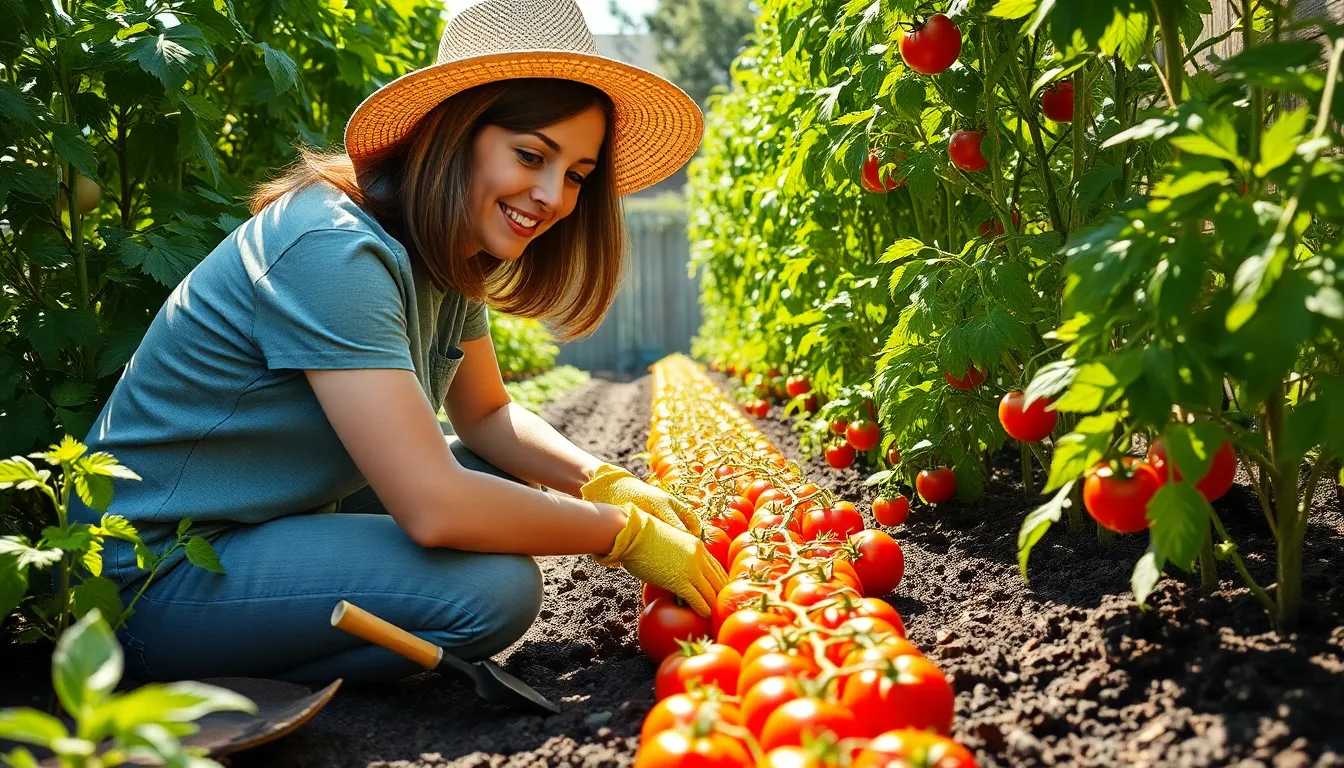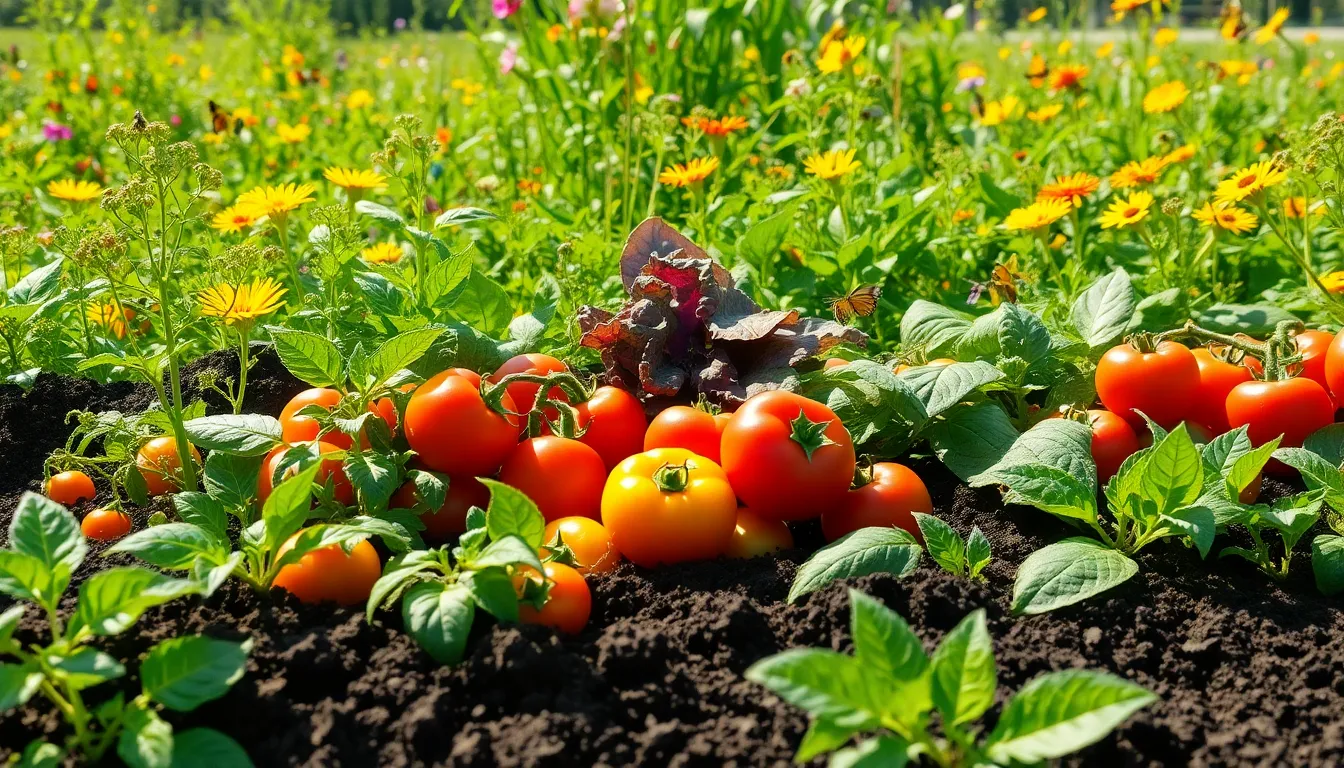Phone:
(701)814-6992
Physical address:
6296 Donnelly Plaza
Ratkeville, Bahamas.

Imagine biting into a juicy tomato, bursting with flavor, and knowing it was grown right in your backyard. Organic vegetable gardening isn’t just a trend; it’s a delicious revolution. With a little dirt under your nails and a sprinkle of patience, anyone can transform their patch of earth into a bountiful oasis of fresh veggies.
Organic vegetable gardening offers numerous advantages. These benefits enhance personal health and foster environmental sustainability.
Fresh organic vegetables contain higher nutritional values than conventionally grown produce. They often lack harmful pesticides and synthetic fertilizers, promoting overall well-being. Research indicates that organic vegetables have increased levels of vitamins C and E, as well as antioxidants, contributing to disease prevention and improved immune function. Consuming organic produce may reduce exposure to toxins and harmful chemicals. Individuals experience better digestion when eating fresh, chemical-free vegetables. Engaging in organic gardening also encourages physical activity, which is crucial for maintaining a healthy lifestyle.
Organic vegetable gardening supports biodiversity while minimizing negative effects on ecosystems. It avoids chemical pesticides, protecting beneficial insects and pollinators, such as bees and butterflies. Practices like crop rotation and companion planting enhance soil health and fertility, reducing erosion and maintaining water quality. Organic methods help lower carbon footprints by using renewable resources and reducing greenhouse gas emissions. Natural gardening practices improve soil structure and promote sustainable ecosystems. Organic gardening techniques contribute to the overall health of the planet, ensuring future generations benefit from a balanced environment.

Organic gardening focuses on key principles that ensure healthy vegetables and sustainable practices. Understanding these principles fosters a successful and eco-friendly gardening experience.
Soil health plays a crucial role in organic gardening. Healthy soil contains essential nutrients, microorganisms, and organic matter. Composing organic matter, like compost or well-rotted manure, enriches soil and enhances drainage. Crop rotation contributes to soil resilience and reduces pest populations. Testing soil for pH and nutrient levels informs effective amendments tailored to specific plants. Maintaining a balanced soil ecosystem prevents erosion, improves water retention, and encourages robust plant growth.
Biodiversity enriches organic gardening environments. Diverse plant species attract beneficial insects and pollinators, supporting overall garden health. Companion planting optimizes growth, deters pests, and fosters symbiotic relationships among plants. Incorporating native plants boosts resilience and adapts easily to local conditions. Additionally, implementing diverse crops minimizes disease spread and helps control pests naturally. Emphasizing biodiversity in the garden cultivates a thriving ecosystem that sustains itself over time.
Getting started with organic vegetable gardening involves careful planning and preparation. Selecting the right location and choosing organic seeds play crucial roles in achieving a successful garden.
Proper sunlight exposure influences plant growth. Aim for a location that receives at least six to eight hours of direct sunlight daily. Access to water is essential, so consider proximity to a water source for easy irrigation. Soil drainage affects plant health; choose a spot with well-draining soil. Assessing wind conditions helps prevent damage to delicate plants. Identifying pre-existing vegetation can serve as a guide to understand the local ecosystem. Each of these factors contributes significantly to a thriving organic vegetable garden.
Organic seeds ensure that plants grow without synthetic pesticides or fertilizers. Look for seeds labeled as organic from reputable suppliers. Heirloom varieties offer unique flavors and traits, enhancing garden diversity. Regional climate and growing conditions guide seed selection for optimal growth. Researching local planting times helps determine the best seeds for each season. Saving seeds from your harvest encourages sustainability and self-sufficiency. These considerations lead to a productive and healthy organic vegetable garden.
Organic pest management involves strategies that minimize the presence and impact of pests without relying on synthetic chemicals. This approach supports a healthy garden ecosystem while protecting plants from harmful invaders.
Beneficial insects play a vital role in controlling pest populations. Ladybugs, lacewings, and parasitic wasps target aphids, caterpillars, and other pests. Neem oil serves as another effective option, acting as both a repellent and disruptor of insect life cycles. Using garlic or diatomaceous earth can deter pests naturally while remaining safe for plants and wildlife. These methods promote a balanced garden environment.
Companion planting enhances pest control and encourages plant health. Some plants naturally repel pests while attracting beneficial insects. For instance, marigolds deter nematodes and other garden pests, while basil keeps flies and mosquitoes at bay. Planting beans alongside corn improves growth and supports pest resistance. Diverse plant arrangements create a multi-layered ecosystem that strengthens resistance against infestations.
Harvesting vegetables at the right time ensures peak flavor and maximum nutritional value. A quick inspection of the vegetable can reveal its readiness. For example, tomatoes should be firm and fully colored before picking. Carrots need a gentle tug on the top to determine their size. Using clean, sharp tools reduces the risk of damaging the plant and allows for a clean cut. Furthermore, harvesting in the morning when temperatures are cooler helps preserve freshness.
Inspect crops regularly for signs of ripeness. Selecting a couple of key indicators can guide decisions. For lettuce, look for full heads and crisp leaves. Cucumbers should be harvested before they turn yellow. Snip or twist stems carefully for clean cuts. Avoid pulling to prevent uprooting remaining plants. Handlers should store harvested produce in shallow containers to prevent bruising. Handling vegetables gently ensures they stay fresh longer.
Storing vegetables properly extends their shelf life. Cool, dark places work best for most varieties. Potatoes prefer banded paper or burlap bags for optimal ventilation. Leafy greens benefit from crisp storage in perforated bags within the fridge. Keep humidity levels balanced to avoid wilting or spoilage. Cleaning vegetables before storage reduces residual dirt and prevents mold growth. Organizing items by type helps maintain freshness longer. Regularly check stored produce for signs of spoilage to manage waste.
Organic vegetable gardening offers an enriching experience that goes beyond just growing food. It’s a journey that nurtures both the body and the environment. By embracing organic practices, gardeners contribute to a healthier lifestyle while promoting sustainability.
The joy of harvesting fresh vegetables is unparalleled. Each bite reflects the effort put into creating a thriving garden ecosystem. With the right techniques and a bit of patience, anyone can enjoy the fruits of their labor.
Engaging in this rewarding practice not only enhances personal well-being but also fosters a connection to nature. As more people discover the benefits of organic gardening, they pave the way for a greener future.